Spartacus Blog
The Hidden History of Ruskin College
Thursday, 17th August, 2017

A few weeks ago I was writing about Noah Ablett, a coalminer who attended Ruskin College in 1907. I was surprised to read that in March, 1909, he led a student strike in protest at the sacking of Dennis Hird, the Principal of Ruskin, who had been accused of teaching socialism through his lectures on sociology and evolution. This seemed an interesting story so I went to the Ruskin College official website to see if I could find out more about this incident.
The History of Ruskin College website is very brief. "Our founders understood that education is power. Founded in 1899 at a time of ferment in political and educational ideas, Ruskin College aimed to provide university-standard education for working class people to empower them to act more effectively on behalf of working class communities and organisations such as trade unions, political parties, co-operative societies and working men's institutes. Our ethos remains the same. We’re committed to providing learning that transforms individual lives and societies."
It is true that indeed what the founders, who are strangely not named, wanted, but it does not tell the story of how Oxford University managed to undermine the intentions of these pioneers in working-class education. They have also been very successful in preventing this important story from entering the public domain.
Charles A. Beard was a student at DePauw University when he joined the Hull House social settlement in Chicago. In 1898 he arrived in England to study at Oxford University. He became friends with a fellow American student, Walter Vrooman, a Christian Socialist. Both men "undeniably held unorthodox views on class and gender politics" and decided that they wanted to do something about improving working-class education. (1)
In February, 1899 Beard and Vrooman established Ruskin Hall (later known as Ruskin College), a free university offering evening and correspondence courses for working class people. The two men received most of the funds for the project from Amne Vrooman. (2) It was named after the essayist John Ruskin (1819–1900), who had written extensively about adult education. (3) The idea was that "economics and sociology should be taught from the working-class point of view, although not to the exclusion of the official capitalist standpoint, if that was thought desirable". (4)
Ruskin College the "College of the People"
Ruskin Hall was also called a "College of the People" and the "Workman’s University". It was to be a residential institution providing study opportunities for a whole year or for shorter periods as appropriate. The residential element of the College’s work in its early years was open to men only. Harold Pollins pointed out: "It was to be part of a nationwide movement in order to cater for the large number who wanted to study but would not be able to take time off work. Provision for them, women as well as men, would be in two parts: correspondence courses, and extension classes in their own localities taught by the Ruskin Hall Faculty and by other lecturers." (5)
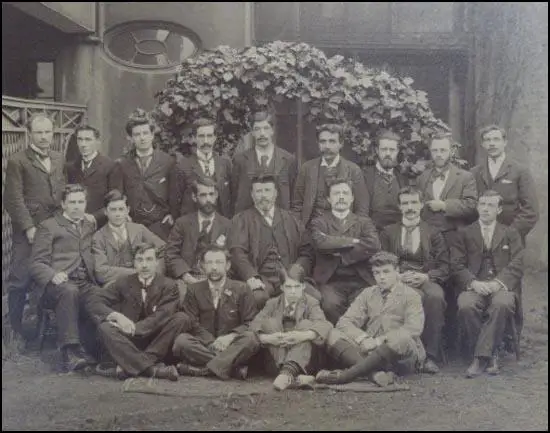
Robert Carruthers (top, third left), Bertram Wilson (top, eighth left), George Sims
(middle, first left), Dennis Hird (middle, fourth left), Frank Merry (middle, sixth left)
and Joseph Heywood (middle, seventh left).
Vrooman argued "that knowledge must be used to emancipate humanity, not to gratify curiosity, blind instincts and desire for respectability". At the public meeting that launched the college, he said: "The Ruskin students come to Oxford, not as mendicant pilgrims go to Jerusalem, to worship at her ancient shrines and marvel at her sacred relics, but as Paul went to Rome, to conquer in a battle of ideals". Dennis Hird was appointed as the college's first principal. Hird was a member of the Social Democratic Federation and the former rector of St John the Baptist Church, in Eastnor, who had been sacked for a lecture he gave on the subject, Jesus the Socialist (it was later published as a pamphlet that sold 70,000 copies.) (6)
Charles A. Beard and Walter Vrooman established a Council to run Ruskin College. It consisted mainly of university men, whom he thought in sympathy with the ideals he set for the educational work on the institution. Three trade unionists, Richard Bell, General Secretary of the Amalgamated Society of Railway Servants, David Shackleton, the leader of the Weavers' Union and General Secretary of the London Society of Compositors, Charles W. Bowerman, also served on the Council. (7)
The students, almost all of them sent on trade union scholarships worth £52. Some of the early students included Edward Traynor (a Yorkshire miner who had lost a leg in a accident at work), Robert Carruthers (a former railway booking clerk and a soldier in the King’s Own Scottish Borderers), Frank Merry (a member of the Independent Labour Party (ILP) and secretary to Walter Vrooman), Joseph Heywood (an apprentice journalist on the Manchester Guardian) and Horace J Hawkins (a member of the Social Democratic Federation who was expelled from the college in November, 1899). The students were expected to carry out nearly all of the domestic duties, the cooking, serving, washing up the duties and the general cleanliness.
Dennis Hird v Hastings Lees-Smith
Janet Vaux has argued that "Ruskin... was conceived of it as a co-operative community and labour college. Other influences on the college included academics at Oxford University who were interested in extending university education beyond the upper-class boys who were its usual customers; and many in the labour movement who saw education as a key to gaining political power." The first eighteen students who joined the college on 22nd February 1899. By the end of the year the college had fifty-five students. (8)
At the college Dennis Hird taught sociology, evolution and formal logic. This meant that Hird was teaching sociology to his students at Ruskin College nearly 50 years before it was officially recognised by the University of Oxford. Hird also published a book explaining and popularising the theory of evolution, The Picture Book of Evolution (1906) Hird also introduced his students to the work of Karl Marx, Charles Darwin, Herbert Spencer and Émile Durkheim. (9)
Dennis Hird was especially interested in promoting the work of the American sociologist, Frank Lester Ward, a supporter of female and racial equality, who argued that poverty could be minimized or eliminated by the systematic intervention of the government. His work was very controversial and was banned in several countries, including Russia. Although his lectures on Ward was popular with the students they upset senior figures at Oxford University. One academic commented that before "Frank Lester Ward could begin to formulate that science of society which he hoped would inaugurate an era of such progress as the world had not yet seen, he had to destroy the superstitions that still held domain over the mind of his generation. Of these, laissez-faire was the most stupefying, and it was on the doctrine of laissez-faire that he trained his heaviest guns." (10)
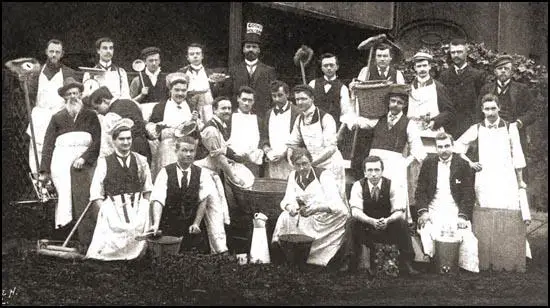
In addition to Hird, three other lecturers were appointed by Vrooman. Hastings Lees-Smith, who also served as vice-principal, Bertram Wilson, who became general secretary of the college, and Alfred Hacking, a friend and supporter of Hird, who was placed in charge of the correspondence students. Almost all of the students arrived on trade union scholarships worth £52. (11)
Hastings Lees-Smith disagreed with the politics of Hird. He was educated for an army career, first at the Aldenham School and then at the Royal Military Academy, but as a result of "a weak constitution" he left to join Queen's College. In 1899 he graduated with second-class honours in history. A member of the Liberal Party he taught economics and as he was a supporter of the free-market he upset the socialist students at Ruskin. (12)
After two years Amne Vrooman, who had divorced her husband, stopped funding Ruskin College. The general secretary of the college, was forced to seek donations from private individuals. Bertram Wilson, General Secretary of Ruskin College sent out letters explaining why they needed donations. The letters showed that the authorities were already undermining the intentions of the founders. For example, this one was written in 1907: "Madam, I hope I am doing right in bringing Ruskin College to your notice. It was founded eight years ago with the object of giving workingmen a sound practical knowledge of subjects which concern them as citizens, thus enabling them to view social questions sanely and without unworthy class bias." (13)
Most of the people who provided the funding of the college did not share the political beliefs of Hird. Janet Vaux has argued that "Ruskin... was conceived of it as a co-operative community and labour college. Other influences on the college included academics at Oxford University who were interested in extending university education beyond the upper-class boys who were its usual customers; and many in the labour movement who saw education as a key to gaining political power." (14)
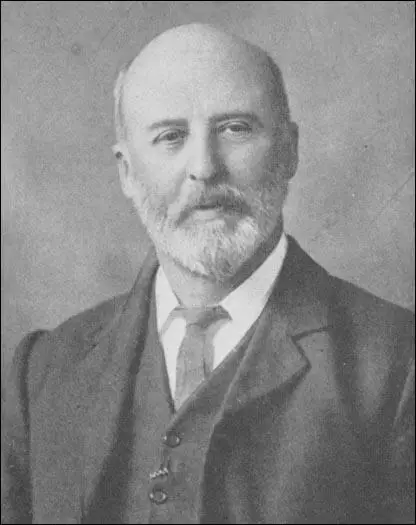
Hastings Lees-Smith complained about the teaching of sociology as it tended to radicalize the students. Dennis Hird replied with a quote the objectives of Walter Vrooman, the founder of Ruskin College: "We shall take men who have been merely condemning our social institutions, and will teach them instead how to transform those institutions, so that in place of talking against the world, they will begin methodically and scientifically to possess the world, to refashion it, and to cooperate with the power behind evolution in making it a joyous abode of, if not a perfected humanity, at least a humanity earnestly and rationally striving towards perfection". (15)
The students became increasingly disturbed by the economic teaching of Hastings Lees-Smith. At the time the Miners' Federation of Great Britain were attempting to negotiate with the Coal Owners Association a minimum wage for its members. Lees-Smith used his lectures to condemn this strategy on the grounds that it would cause unemployment and reduce investment. Sidney Webb, the Labour Party politician, who advocated the minimum wage, was accused of telling "a tissue of lies". (16)
One of the students, J. M. K. MacLachlan, wrote an article for the September edition of Young Oxford (the journal of the Ruskin College students): "The present policy of Ruskin College is that of a benevolent trader sailing under a privateer flag. Professing the aims dear to all socialists, she disavows those very principles by repudiating socialism. Let Ruskin College proclaim socialism; let her convert her name from a form of contempt into a canon of respect." (17)
Noah Ablett, a member of the South Wales Miners' Federation, began a course at Ruskin College in 1907. He was completely self-educated and after reading the works of Karl Marx, Daniel De Leon and Tom Mann, he became a committed socialist. According to his biographer, Hywel Francis, "he quickly made his mark on educational thinking at Ruskin, and organized classes in Marxian economics and history as an alternative to the traditional liberal curriculum". (18)
Bernard Jennings argues that Ablett had a considerable influence over the students at Ruskin: "Tensions began to build as increasing numbers of students became ardent socialists. They enjoyed Hird's lectures on sociology, a major element of which was the study of evolution, on which he had written a popular book. They disliked Lees Smith's lectures on economics, although acknowledging his ability as a teacher, because his adherence to current free-market theories was just as dogmatic as that of the left-wing students to Marxism." (19)
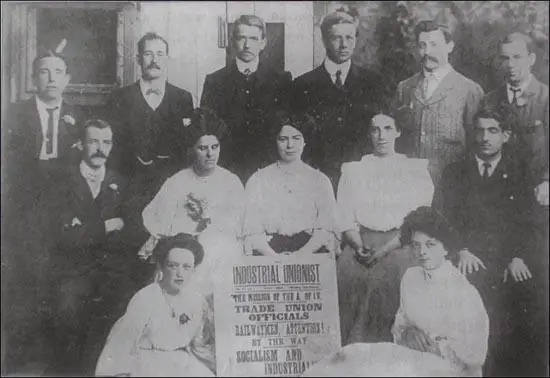
In 1907 Hastings Lees-Smith, who was later to become a Liberal Party MP, was appointed professor of economics at University College, but he did not relax his grip on Ruskin. Lees-Smith was Oxford University's man at the college and so he was appointed chairman of Ruskin College's executive committee and chief adviser on studies. He now had control over staff recruitment and appointed, Charles Stanley Buxton, aged 23 as vice-principal. His father was Charles Sydney Buxton, the President of the Board of Trade, another establishment figure. (20)
Lees-Smith also recruited Henry Sanderson Furniss to lecture on economics, who both shared his view "of the relationship between class improvement and education". Sanderson Furniss came to realise that he and Buxton were intended to carry on Lees Smith's campaign against Hird: "They were, however, ill-equipped to do so, or to provide an antidote to the Marxist ideas which Furniss criticised without knowing much about them. They knew little about teaching, and less about working-class life." (21)
Although Dennis Hird was the Principal of Ruskin College, he was not consulted on these appointments. In 1899 his duties were defined as "to be in charge at Ruskin Hall". However, this was later changed to say all decisions were to be made by a House Committee of three, consisting of the Principal, the Vice-Principal and the General Secretary of the College. Buxton and Sanderson Furniss now joined forces to constantly outvote Hird. (22)
Noah Ablett rebelled against these developments and set up Marxist tutorial classes in the central valleys of the Welsh coalfield. In January 1909, Ablett and some of his followers established the Plebs League, an organisation committed to the idea of promoting left-wing education amongst workers. Over the next few weeks branches were established in five towns in the coalfield. Arthur J. Cook and William H. Mainwaring were two early recruits to these classes. (23) Ablett was described as "a remarkable young man, a rebel of cosmopolitan, perhaps cosmic, importance" and "as an educator and ideologue, he was unique". (24)
In September 1907, Hastings Lees-Smith tried to marginalise Dennis Hird by proposing some new rules such as the requirement for regular essays and quarterly revision papers. In an attempt to deal with people like Ablett, students were forbidden to speak in public without the permission of the executive committee. It was made clear to Henry Sanderson Furniss that he was expected to try and reduce the radicalism in the college. (25)
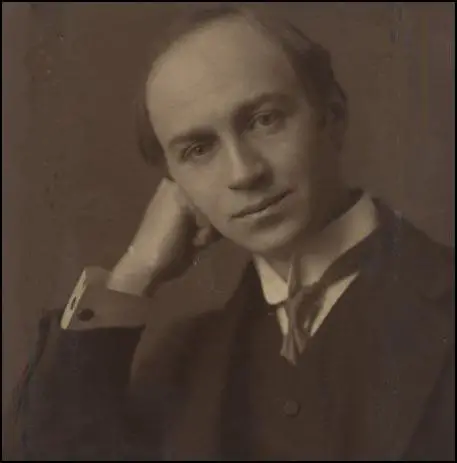
In November 1908, Oxford University announced that it was going to take over Ruskin College. The chancellor of the university, George Curzon, was the former Conservative Party MP and the Viceroy of India. His reactionary views were well-known and was the leader of the campaign to prevent women having the vote. Curzon visited the college where he made a speech to the students explaining the decision. (26)
Dennis Hird replied to Curzon: "My Lord, when you speak of Ruskin College you are not referring merely to this institution here in Oxford, for this is only a branch of a great democratic movement that has its roots all over the country. To ask Ruskin College to come into closer contact with the University is to ask the great democracy whose foundation is the Labour Movement, a democracy that in the near future will come into its own, and, when it does, will bring great changes in its wake".
The author of The Burning Question of Education (1909) reported: "As he concluded, the burst of applause that emanated from the students seemed to herald the dawn of the day Dennis Hird had predicted. Without another word, Lord Curzon turned on his heel and walked out, followed by the remainder of the lecture staff, who looked far from pleased. When the report of the meeting was published in the press, the students noted that significantly enough Dennis Hird's reply was suppressed, and a few colourless remarks substituted." (27)
William Craik, a member of the Amalgamated Society of Railway Servants (later the National Union of Railwaymen) pointed out that his fellow students were "very perturbed at the direction in which the teaching and control of the College was moving, and by the failure of the trade union leaders to make any effort to change that direction. We new arrivals had little or no knowledge of what had been taking place at Ruskin before we got there. Most of us were socialists of one party shade or other." (28)
Students of Ruskin College were forbidden to speak in public without the permission of the executive committee. In an effort to marginalise Dennis Hird, new rules such as the requirement for regular essays and quarterly revision papers were introduced. "This met with strong resistance from the majority of the students, who looked upon it as one more way of making the connection with the University still closer... Most of the students had come to Ruskin College on the understanding that there would be no tests other than monthly essays set and examined by their respective tutors, and afterwards discussed in personal interviews with them." (29)
In August 1908, Charles Stanley Buxton, the vice-principal of Ruskin College, published an article in the Cornhill Magazine. He wrote that "the necessary common bond is education in citizenship, and it is this which Ruskin College tries to give - conscious that it is only a new patch on an old garment." (30) It has been argued that "it read as if it had been written by someone who looked upon the workers as a kind of new barbarians whom he and his like had been called upon to tame and civilise". (31) The students were not convinced by this approach as Dennis Hird had told them about the quotation of Karl Marx: "The more the ruling class succeeds in assimilating members of the ruled class the more formidable and dangerous is its rule." (32)
In 1909 Lord George Curzon published Principles and Methods of University Reform. In the book he pointed out that it was vitally important to control the education of future leaders of the labour movement. He urged universities to promote the growth of an elite leadership and rejected the 19th century educational reformers call for reform on utilitarian lines to encourage "upward movement" of the capitalist middle class: "We must strive to attract the best, for they will be the leaders of the upward movement... and it is of great importance that their early training should be conducted on liberal rather than on utilitarian lines." (33)
In February, 1909, Dennis Hird was investigated in order to discover if he had "deliberately identified the college with socialism". The sub-committee reported back that Hird was not guilty of this offence but did criticise Henry Sanderson Furniss for "bias and ignorance" and recommended the appointment of another lecturer in economics, more familiar with working class views. Hastings Lees-Smith and the executive committee rejected this suggestion and in March decided to dismiss Hird for "failing to maintain discipline". He was given six months' salary (£180) in lieu of notice, plus a pension of £150 a year for life. (34)
It is believed that 20 students were members of the Plebs League. Its leader, Noah Ablett organised a students' strike in support of Hird. (35) The Ruskin authorities decided to close the college for a fortnight and then re-admit only students who would sign an undertaking to observe the rules. Of the 54 students at Ruskin at that time, 44 of them agreed to sign the document. However, the students decided that they would use the Plebs League and its journal, the Plebs' Magazine, to campaign for the setting up of a new and real Labour College. (36)
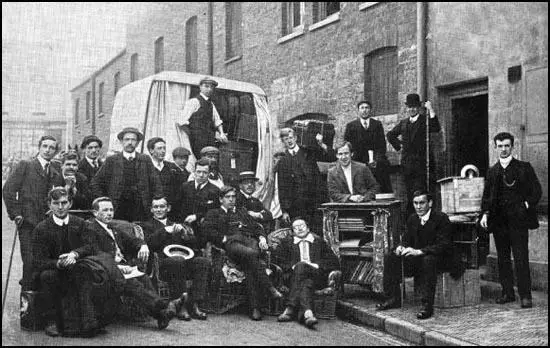
Dennis Hird received very little support from other advocates of working-class education. Albert Mansbridge, the
founder of the Workers' Educational Association (WEA) in 1903, blamed Hird's preaching of socialism for his dismissal. In a letter to a French friend, he wrote "the low-down practice of Dennis Hird in playing upon the class consciousness of swollen-headed students embittered by the gorgeous panorama ever before them of an Oxford in which they have no part." (37)
Noah Ablett took the lead in establishing an alternative to Ruskin College. He saw the need for a residential college as a cadre training school for the labour movement that was based on socialist values. George Sims, who had been expelled after his involvement in the Ruskin strike, played an important role in raising the funds for the project. On 2nd August, 1909, Ablett and Sims organised a conference that was attended by 200 trade union representatives. Dennis Hird, Walter Vrooman and Frank Lester Ward were all at the conference. (38)
Sims explained that the "last link which bound Ruskin College to the Labour Movement had been broken, the majority of the students had taken the bold step of trying to found a new college owned and controlled by the organised Labour Movement." (39) Ablett moved the resolution: "That this Conference of workers declares that the time has now arrived when the working class should enter the educational world to work out its own problems for itself." (40)
The conference agreed to establish the Central Labour College (CLC). The students rented two houses in Bradmore Road in Oxford. It was decided that "two-thirds of representation on Board of Management shall be Labour organisations on the same lines as the Labour Party constitution, namely, Trade Unions, Socialist societies and Co-operative societies." Most of the original funding came from the South Wales Miners' Federation (SWMF) and the National Union of Railwaymen (NUR). (41)
Dennis Hird agreed to act as Principal and to lecture on sociology and other subjects, without any salary. George Sims worked as its secretary and Alfred Hacking was employed as tutor in English grammar and literature. Fred Charles accepted a post as tutor in industrial and political history. The teaching staff was supplemented by regular visiting lecturers, such as Frank Horrabin, Winifred Batho, Rebecca West, Emily Wilding Davison, H. N. Brailsford, Arthur Horner and Frederick Pethick-Lawrence.
Dr. Gilbert Slater
At a meeting on 30th October, 1909, to discuss the sacking of Dennis Hird. The chairman, Hastings Lees-Smith, attempted to rush through a resolution endorsing the action of the Council of the College in discharging Hird. David Shackleton, the leader of the Weavers' Union, argued against the resolution. Eventually, it was decided to create a new Governing Council. It was now consisted of two representatives from the Trade Union Congress, two from the Co-operative Union and one from the Workingmen's Club and Institute Union. Oxford University had now lost control of Ruskin College.
Dr. Gilbert Slater was appointed as the new principal of Ruskin College. He was a member of the Labour Party and was chairman, vice-chairman, or secretary of many local committees connected with unemployment and the anti-sweating campaign. He had also just finished his PhD at the London School of Economics. Slater position was strengthened by the public support of the leading lights of the labour movement - George Lansbury, Keir Hardie, Sidney Webb, Will Crooks, Pete Curran, and J. A. Hobson.
As Harold Pollins has pointed out: "A major feature of the conflict at Ruskin in 1909 was its constitution. The striking students and their allies demanded that working-class education should be under the control of working-class organizations. Ruskin's governing council included Oxford University dons as well as others from outside the labour movement. Slater made his mark rapidly by recommending a change in the college's structure: in future only representatives of working-class organizations could be represented on the governing council." (42)
The new Governing Council consisted of: James Sexton and Charles W. Bowerman (Trade Union Council), Ben Tillett (General Federation of Trade Unions), A. E. Wood and W. H. Berry (Working Men’s Club and Institute Union), J. Hill and J. Jones (Amalgamated Society of Engineers) J.Cairns (Northumberland Miners’ Association) F. Thomas (Weavers’ Amalgamation) and S. Ledbury (Amalgamated Society of Toolmakers).
Central Labour College
Under Slater's principalship Ruskin College settled down and flourished. In 1910 the University Diploma in Economics and Political Science was opened up to Ruskin candidates. Later new buildings in Walton Street, that had been built to replace the cottages that formerly housed the College, were opened. Slater now reached out to the Central Labour College and suggested a merger. However, this idea was rejected as the rebellious students were unwilling to give up their power over their education. (43)
In 1910 William Craik, one of the students involved in the strike, was appointed as Vice-Principal and virtually ran the college as Dennis Hird was now in very poor health. In 1911 the college moved to London. "Very soon after the College arrived in Kensington it began to conduct evening classes, both within and without, for the working men and women in the district, and to extend their range. Not many years were to pass before there was hardly a suburb in Greater London without one or more Labour College classes at work in it. Nothing like this, needless to say, would have been possible had the College remained in Oxford." (44)
John Saville has argued that the Central Labour College provided the kind of socialist education that was not provided by Ruskin College or the Workers' Educational Association. "What we have in these years is both the attempt to channel working-class education into the safe and liberal outlets of the Workers' Educational Association and Ruskin College, and the development of working-class initiatives from below; and it is the latter only which made its contribution to the socialist movement - and a considerable contribution it was." (45)
Bernard Jennings agrees with Saville on this point and points out that Richard Tawney, A. D. Lindsay and Archbishop William Temple were all supporters of Ruskin College and the WEA over the Central Labour College: "There is no doubt that the establishment preferred the WEA and Ruskin to the Labour college movement, a fact exploited quite brazenly by the WEA in the 1920s. Temple, Tawney and A. D. Lindsay all warned the Board of Education and the LEAs that unless they supported the WEA and respected its academic freedom, workers' education would fall to the CLC." (46)
References
Previous Posts
The Hidden History of Ruskin College (17th August, 2017)
Underground child labour in the coal mining industry did not come to an end in 1842 (2nd August, 2017)
Raymond Asquith, killed in a war declared by his father (28th June, 2017)
History shows since it was established in 1896 the Daily Mail has been wrong about virtually every political issue. (4th June, 2017)
The House of Lords needs to be replaced with a House of the People (7th May, 2017)
100 Greatest Britons Candidate: Caroline Norton (28th March, 2017)
100 Greatest Britons Candidate: Mary Wollstonecraft (20th March, 2017)
100 Greatest Britons Candidate: Anne Knight (23rd February, 2017)
100 Greatest Britons Candidate: Elizabeth Heyrick (12th January, 2017)
100 Greatest Britons: Where are the Women? (28th December, 2016)
The Death of Liberalism: Charles and George Trevelyan (19th December, 2016)
Donald Trump and the Crisis in Capitalism (18th November, 2016)
Victor Grayson and the most surprising by-election result in British history (8th October, 2016)
Left-wing pressure groups in the Labour Party (25th September, 2016)
The Peasant's Revolt and the end of Feudalism (3rd September, 2016)
Leon Trotsky and Jeremy Corbyn's Labour Party (15th August, 2016)
Eleanor of Aquitaine, Queen of England (7th August, 2016)
The Media and Jeremy Corbyn (25th July, 2016)
Rupert Murdoch appoints a new prime minister (12th July, 2016)
George Orwell would have voted to leave the European Union (22nd June, 2016)
Is the European Union like the Roman Empire? (11th June, 2016)
Is it possible to be an objective history teacher? (18th May, 2016)
Women Levellers: The Campaign for Equality in the 1640s (12th May, 2016)
The Reichstag Fire was not a Nazi Conspiracy: Historians Interpreting the Past (12th April, 2016)
Why did Emmeline and Christabel Pankhurst join the Conservative Party? (23rd March, 2016)
Mikhail Koltsov and Boris Efimov - Political Idealism and Survival (3rd March, 2016)
Why the name Spartacus Educational? (23rd February, 2016)
Right-wing infiltration of the BBC (1st February, 2016)
Bert Trautmann, a committed Nazi who became a British hero (13th January, 2016)
Frank Foley, a Christian worth remembering at Christmas (24th December, 2015)
How did governments react to the Jewish Migration Crisis in December, 1938? (17th December, 2015)
Does going to war help the careers of politicians? (2nd December, 2015)
Art and Politics: The Work of John Heartfield (18th November, 2015)
The People we should be remembering on Remembrance Sunday (7th November, 2015)
Why Suffragette is a reactionary movie (21st October, 2015)
Volkswagen and Nazi Germany (1st October, 2015)
David Cameron's Trade Union Act and fascism in Europe (23rd September, 2015)
The problems of appearing in a BBC documentary (17th September, 2015)
Mary Tudor, the first Queen of England (12th September, 2015)
Jeremy Corbyn, the new Harold Wilson? (5th September, 2015)
Anne Boleyn in the history classroom (29th August, 2015)
Why the BBC and the Daily Mail ran a false story on anti-fascist campaigner, Cedric Belfrage (22nd August, 2015)
Women and Politics during the Reign of Henry VIII (14th July, 2015)
The Politics of Austerity (16th June, 2015)
Was Henry FitzRoy, the illegitimate son of Henry VIII, murdered? (31st May, 2015)
The long history of the Daily Mail campaigning against the interests of working people (7th May, 2015)
Nigel Farage would have been hung, drawn and quartered if he lived during the reign of Henry VIII (5th May, 2015)
Was social mobility greater under Henry VIII than it is under David Cameron? (29th April, 2015)
Why it is important to study the life and death of Margaret Cheyney in the history classroom (15th April, 2015)
Is Sir Thomas More one of the 10 worst Britons in History? (6th March, 2015)
Was Henry VIII as bad as Adolf Hitler and Joseph Stalin? (12th February, 2015)
The History of Freedom of Speech (13th January, 2015)
The Christmas Truce Football Game in 1914 (24th December, 2014)
The Anglocentric and Sexist misrepresentation of historical facts in The Imitation Game (2nd December, 2014)
The Secret Files of James Jesus Angleton (12th November, 2014)
Ben Bradlee and the Death of Mary Pinchot Meyer (29th October, 2014)
Yuri Nosenko and the Warren Report (15th October, 2014)
The KGB and Martin Luther King (2nd October, 2014)
The Death of Tomás Harris (24th September, 2014)
Simulations in the Classroom (1st September, 2014)
The KGB and the JFK Assassination (21st August, 2014)
West Ham United and the First World War (4th August, 2014)
The First World War and the War Propaganda Bureau (28th July, 2014)
Interpretations in History (8th July, 2014)
Alger Hiss was not framed by the FBI (17th June, 2014)
Google, Bing and Operation Mockingbird: Part 2 (14th June, 2014)
Google, Bing and Operation Mockingbird: The CIA and Search-Engine Results (10th June, 2014)
The Student as Teacher (7th June, 2014)
Is Wikipedia under the control of political extremists? (23rd May, 2014)
Why MI5 did not want you to know about Ernest Holloway Oldham (6th May, 2014)
The Strange Death of Lev Sedov (16th April, 2014)
Why we will never discover who killed John F. Kennedy (27th March, 2014)
The KGB planned to groom Michael Straight to become President of the United States (20th March, 2014)
The Allied Plot to Kill Lenin (7th March, 2014)
Was Rasputin murdered by MI6? (24th February 2014)
Winston Churchill and Chemical Weapons (11th February, 2014)
Pete Seeger and the Media (1st February 2014)
Should history teachers use Blackadder in the classroom? (15th January 2014)
Why did the intelligence services murder Dr. Stephen Ward? (8th January 2014)
Solomon Northup and 12 Years a Slave (4th January 2014)
The Angel of Auschwitz (6th December 2013)
The Death of John F. Kennedy (23rd November 2013)
Adolf Hitler and Women (22nd November 2013)
New Evidence in the Geli Raubal Case (10th November 2013)
Murder Cases in the Classroom (6th November 2013)
Major Truman Smith and the Funding of Adolf Hitler (4th November 2013)
Unity Mitford and Adolf Hitler (30th October 2013)
Claud Cockburn and his fight against Appeasement (26th October 2013)
The Strange Case of William Wiseman (21st October 2013)
Robert Vansittart's Spy Network (17th October 2013)
British Newspaper Reporting of Appeasement and Nazi Germany (14th October 2013)
Paul Dacre, The Daily Mail and Fascism (12th October 2013)
Wallis Simpson and Nazi Germany (11th October 2013)
The Activities of MI5 (9th October 2013)
The Right Club and the Second World War (6th October 2013)
What did Paul Dacre's father do in the war? (4th October 2013)
Ralph Miliband and Lord Rothermere (2nd October 2013)
